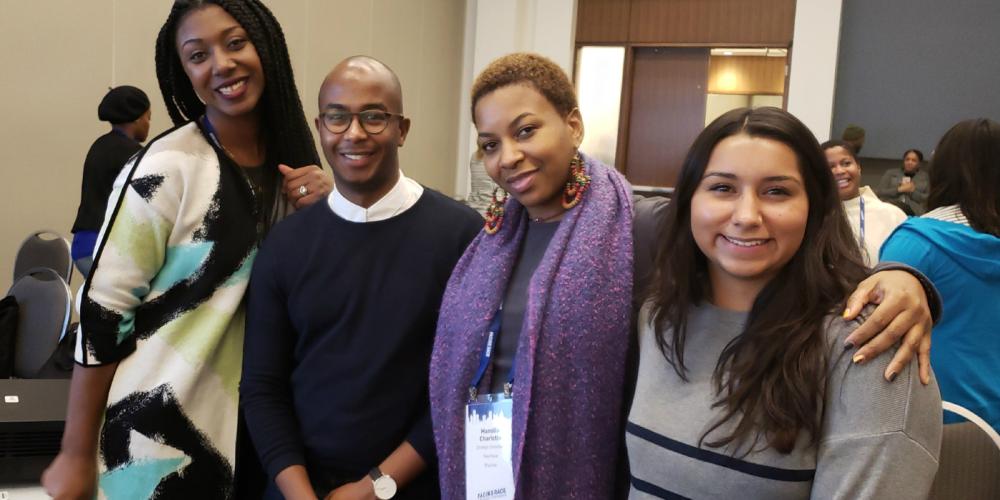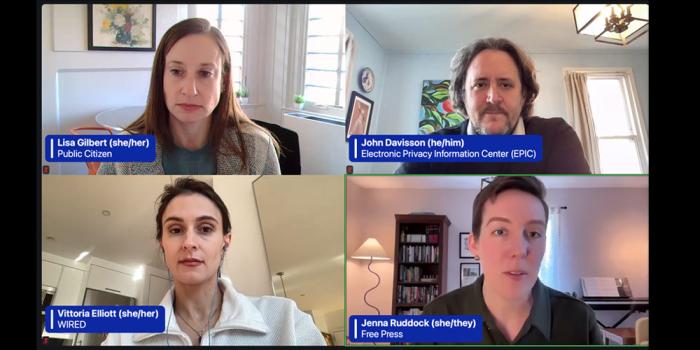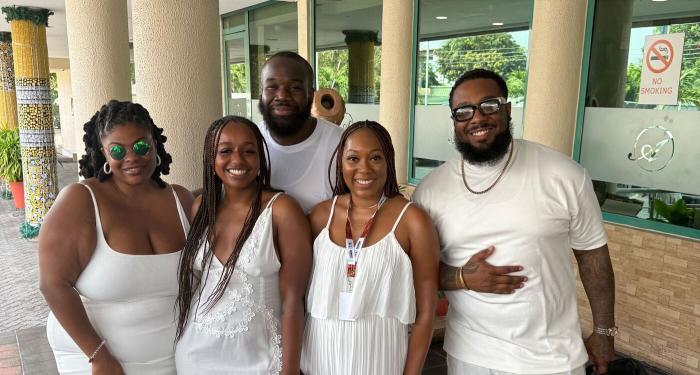Team Free Press at Facing Race 2018: Learning Together

A group of Free Press staffers traveled to Detroit for Facing Race, a biennial conference presented by the good folks at Race Forward.
In the words of Deputy Director and Senior Counsel Jessica J. González, our goal was “to listen, to be in community, to strengthen relationships with our allies who are doing racial-justice work. As we’re fighting for media justice, we want to make sure we’re creating systems that uplift the voices of people of color as they’re doing this kind of work.”
>> Watch the recap video from our trip.
#OwningOurStories panel and audience discussion
In addition to working as our senior director of strategy and engagement, Free Press’ Joseph Torres leads a new initiative called the Media Makers of Color Alliance, a project that’s convening some of the nation’s most brilliant and community-centered thinkers around the topics of racial justice and the media.
Their goal is to collaboratively dream a better future while also naming and analyzing how systemic racism in the media has historically resulted in dangerous political narratives that harm communities of color.
Over the last year, the alliance has held two convenings and produced numerous articles and artworks about the 50th anniversary of the Kerner Commission Report, a landmark publication that then-President Lyndon Johnson commissioned to examine the underlying causes of uprisings that were taking place during the 1960s across Detroit, Newark and other cities.
The report found that systemic racism — including a dangerous cycle of harmful media narratives and practices — was fueling the unrest.
Continuing the #KernerAt50 theme, Torres and project partner Manolia Charlotin organized the panel “Owning Our Stories” for the 2018 Facing Race conference.
The panel opened with media-rights lawyer and Color Of Change Senior Director Brandi Collins-Dexter masterfully outlining the similarities between the era the Kerner report documents and today. From urban unrest to continued racial oppression, a similar context emerges: Mass media are dominated by destructive narratives and controlled by a privileged few who seek to marginalize diverse voices.
One specific parallel that can be drawn between 1968 and 2018 is the state of voting rights.
Joseph Torres discussed the ways that media practices helped deliver certain outcomes in the 2018 midterm elections, in which there was widespread voter suppression reminiscent of the era of the 1960s civil-rights struggle. Prior to Election Day, this cycle saw a bevy of racist, anti-immigrant and White-supremacist advertisements and comments from politicians in states like Georgia, Florida and Mississippi who exploited the lowest racialized fears and fantasies within the electorate.
Therapist and cultural worker Resmaa Menakem elaborated on the many impacts of these types of media, particularly the physical and mental trauma that result from racist narratives, themes, portrayals and the perceptions they cultivate in the real world.
Dreaming the future of media
The Owning Our Stories panel featured strong and consistent participation from the audience. During the Q&A portion, audience members shared their own views of media issues — and interventions for a better path forward.
Oakland entrepreneur Wanda Lee-Stevens shared her story of upending the status quo in the media in the form of her part-time bookshop Book Your Life. Wanda helps aspiring authors cultivate their ideas and then turn them into finished physical products. She also walks authors through the self-publishing process to get their voices into the world.
Menakem said that his latest book was written collaboratively with fellow healers and cultural workers, and that they’re all sharing the credit and profits equally. He also crafted the book by dictating and transcribing spoken thoughts — all part of a departure from the traditional publishing style that sometimes serves as a barrier to entry for marginalized people.
Many more perspectives, wins and dreams were shared: Listen to the full audio of the session in an episode of the Free Press Action podcast “The Connection” on Soundcloud.
If you prefer a shorter reflection of the session and our time at Facing Race, watch this 7-minute recap on YouTube.
Continuing the conversation
The Owning Our Stories discussion was one of over 100 incredible panels and sessions that took place over the course of the 3-day conference, which included keynote speeches by Tarana Burke, Hari Kondabolu and so many more. Media Makers of Color Alliance member and renowned cultural organizer Sage Crump presented a powerful session titled “The Battle for Our Imaginations” that featured the groundbreaking work of panelists who are reimagining what’s possible in multimedia.
Facing Race gave powerful context to Free Press’ work and for a few brief days allowed us to feel the power of an environment where people feel free to build and dream — the type of world we are working to create.
Free Press Special Assistant to the President and CEO O’neil Pryce commented, “It was an inspiring space with different bodies, ideas and iterations of creativity. Not only was I inspired by the panels, I was also inspired by Detroiters’ pride in their beautiful city.”
As we build on the many powerful learnings gathered at this conference, Team Free Press is excited to continue the Media Makers of Color Alliance initiative. Look out in 2019 for a video project, plus continued articles, commentary and much more.
For information on how to become involved, send a tweet to Joseph Torres and be sure to follow @freepress on Twitter and all your favorite social-media channels.
Check out the photos below from our time at Facing Race:






